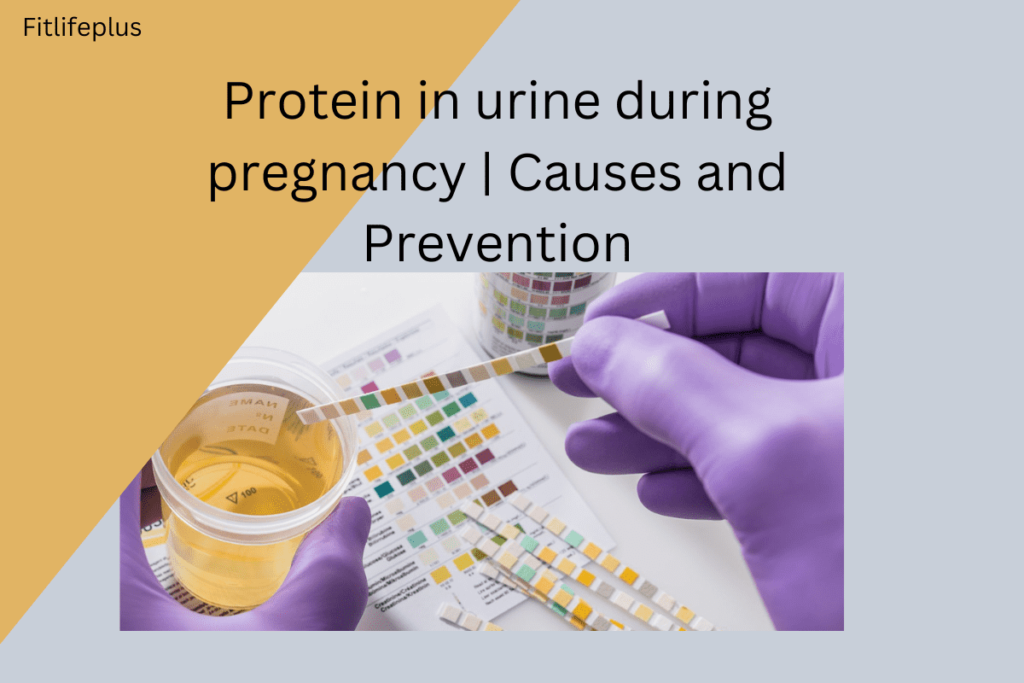Some women have high protein levels in their urine during pregnancy. Unfortunately, the high protein levels come with high blood pressure, which is generally a symptom of preeclampsia. In this article, I will share the details that expectant partners must show.
When pregnant, you constantly visit your healthcare provider, who monitors your and your baby’s health to ensure everything is okay. This routine parental care in countries like the US also has many tests you have never encountered. In some cases, these additional tests also include the urine test to check the protein in urine during pregnancy.
Excessive protein level during pregnancy is unhealthy as it is a symptom of preeclampsia. Preeclampsia is a dangerous condition that can result in high blood pressure. Continue reading to find details about the protein in urine during pregnancy and preeclampsia.

Cause of protein in urine during pregnancy
During pregnancy, your kidneys are hard to work. They filter the waste products in your blood and maintain the other things like proteins in your body. After filtering, the waste is released into your blood.
If excess protein is present in the urine, something is wrong with the functioning of the kidneys. In other cases, here are the few main reasons for the presence of proteins in the urine.
- Fever
- Physical or emotional stress
- Extreme temperatures exposure
- Dehydration
At the same time, there are more conditions in which urine in the blood can be a sign of something else.
Before 20 weeks, experts referred to proteinuria as chronic proteinuria. It can be due to underlying kidney issues or heart diseases unrelated to the pregnancy. Sometimes urinary tract infections are behind increasing the protein levels in the blood. And they require immediate medical attention.
After 20 weeks, the possible cause of the increased protein level is preeclampsia. This condition results in a high level of blood pressure that can affect the functioning of the organs, especially the kidneys and liver.
HELLP syndrome is a similar yet more severe form of preeclampsia that can come with the preeclampsia or may develop independently. Without undergoing treatment, both conditions can result in some serious complications.
Symptoms of protein in urine during pregnancy
Suppose the amount of urine in the urine is considered high if it’s more than 300 mg/d. Sometimes, pregnant women don’t realize something is wrong until their next parental appointment when their urine sample is tested.
Its symptoms are very similar to those of kidney diseases. Here are a few common symptoms:
- Burning sensation during urination
- Back pain that is also normal in pregnancy
- Swelling in wrists, eyes, or ankles
- Bloody, foamy, or brown urine
- Increase in urination
Risk of protein in urine during pregnancy
The risks of protein in urine during pregnancy depend on the cause of its elevated levels. Some causes are not as severe as others but are also easier to treat. Most of the reasons for protein in urine during early pregnancy are not painful.
If the protein in urine is present before 20 weeks, it may not be a severe issue. But still, you need to consult the doctor to evaluate it on time. But if there is an increase in protein after 20 weeks, it can be harmful to you and your baby.
After 20 weeks, the protein in urine comes with high blood pressure and other symptoms like swelling, blurred vision, and difficulty breathing. In such cases, you may have preeclampsia and need to be monitored for the treatment.
Preeclampsi
Preeclampsia is a pregnancy-related condition that usually occurs after 20 weeks of pregnancy. It starts in the placenta with the narrowing of blood vessels, and it also causes a decrease in blood flow. It also results in a rise in blood pressure and makes you retain water.

Though high blood pressure is related to preeclampsia, some women have normal blood pressure that gradually rises throughout their pregnancy, which makes it difficult to detect. The reduced blood flow due to the narrow blood vessels can affect the functioning of the liver, brain, and kidneys.
If left untreated, it can result in more severe conditions like eclampsia which is preeclampsia coupled with seizures, stroke, and kidney diseases.
Preeclampsia symptoms:
- Decrease in urine
- Facia swelling, prominent around the eyes
- Extreme headaches
- Difficulty in breathing
- Blurry vision or temporary vision loss
- Abdominal pain
- Sudden weight gain
- Rapid swelling of extremities
The risk factors of preeclampsia generally include women older than 40, multiple pregnancies, chromic hypertension history, and also in the first pregnancy.
Tests for protein in the urine
The initial test at the doctor’s office is called the dipstick test. In this test, a strip is inserted into your urine sample, and the chemical patches on the stick will change color depending on the amount of protein present. The resulting range goes from + to ++++ to low (+1) to high (+4).
If your result is above average, the doctor will give you a 24-hour urine protein test to monitor the protein levels for extended periods. The urine sample is collected during day time to analyze. Morning urine is not taken for the test. A high result is considered abnormal as it’s a possible sign of the health issues like kidney problems.
If only trace amounts of protein are present in urine, your doctor may not recommend further testing. Or they may consider monitoring other signs for details. It’s common for a trace amount of protein to enter the blood. They can pass the kidneys if they are too small in size. But generally, they are large and usually can’t pass the kidney filtrate to enter the urine.
How to prevent protein in urine during pregnancy?
The urine protein in early pregnancy is related to pre-existing conditions that can be genetic, and there is nothing specific you can do for its prevention. Until now, no clear evidence can suggest any prevention method for preeclampsia.
However, it’s ideal to take some preventive measures before getting pregnant. It’s especially beneficial when you have any pre-existing conditions. Consult your doctor to maintain a healthy weight and diet rich in fruits and vegetables. And also, make sure you have a healthy blood pressure level throughout the day.
And if you are already pregnant, your doctor will recommend a few ways to lower the risk of getting preeclampsia.
- Take calcium supplements if you have a calcium deficiency, which can also prevent preeclampsia. However, it’s challenging in developed countries to develop a lack to the extent of benefitting from this method.
- Suppose you have a pregnancy with multiples, a history of preeclampsia, chronic blood pressure issues, or other health conditions like kidney diseases. It’s recommended to have an 81-milligram dosage and start it at 12 weeks of pregnancy. As aspirin is an over-the-counter medication, it is strictly advised not to do this without consulting your doctor.
In addition, there is a high chance of preeclampsia developing during the first pregnancy. And if you had this condition in the previous pregnancy, you may experience it again during the subsequent pregnancy.
Consult your doctor to see if prevention methods can help you according to your risk factors or health conditions.
FAQ’s
Is the protein in urine severe during pregnancy?
High level of protein in your urine while pregnant can be a severe condition. It is also a sign of a serious condition called preeclampsia. It’s also a potentially dangerous condition resulting in high blood pressure.
What is the cause of protein in urine during pregnancy?
Several reasons result in high protein levels in urine while pregnant. The most common causes include fever, dehydration, physical or emotional stress, or excessive temperature.
Depending upon the time of diagnosis of proteinuria, your doctor can tell you a lot about its cause.
Can protein in urine be temporary?
Suppose a urine test reveals the presence of protein in the urine. In that case, your doctor will recommend more tests to monitor your current condition further, as the protein urine can be temporary, so that the doctor will recommend the tests after 1 to 2 days.
Conclusion
If you get the urine test results and your protein levels are elevated, it is normal to get tensed. But remember one thing: pregnant women usually have a high protein level in their urine, and levels above 300mg/day are worrisome.
If protein levels increase after 21 weeks, it can be a symptom of preeclampsia. But the elevated protein levels alone are not the cause of preeclampsia. It’s essential to stay in touch with your healthcare provider and conduct tests occasionally to monitor the condition. Even if you have preeclampsia, your healthcare provider will ensure you and your baby stay as healthy as usual.




